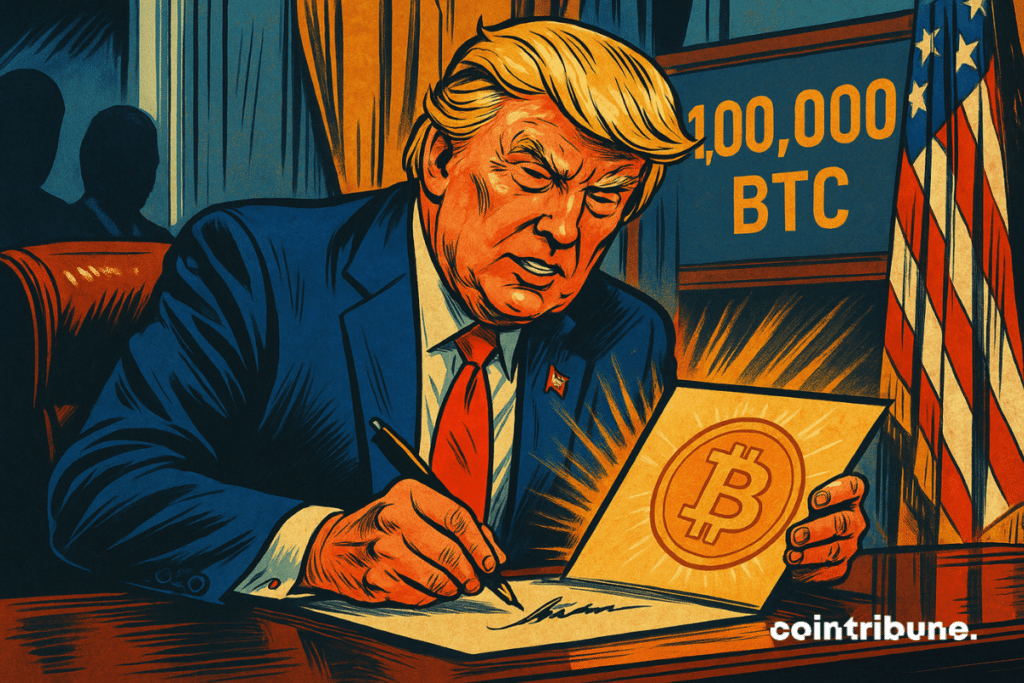15h05 ▪
4
min read ▪ by
The announcement caused a shockwave: Donald Trump fully supports the Bitcoin Act, an ambitious bill proposing the purchase of one million bitcoins by the U.S. government. Far from the usual controversies, this initiative marks a decisive turning point in the country’s economic strategy, with profound geopolitical implications.


In Brief
- Donald Trump supports the Bitcoin Act, proposing the purchase of one million BTC for the United States.
- The administration is prioritizing stablecoins, crypto regulation, and the creation of a strategic bitcoin reserve.
- This shift marks a clear intention to place bitcoin at the heart of American economic sovereignty.
A Strategic Ambition of Unprecedented Scale
Behind the spotlight of American politics, a genuine monetary revolution is unfolding. Donald Trump, more strategic than ever, now seems to be betting big on BTC. The incumbent president officially supports the Bitcoin Act, a bill led by Wyoming Senator Cynthia Lummis, ordering the gradual acquisition of one million BTC by the United States. Nothing less.
This program, funded without any new burden for taxpayers thanks to existing funds from the Federal Reserve and the Treasury, aims at creating a strategic bitcoin reserve. Goal? Prepare the country for a new financial era where digital gold could play a pivotal role. This initiative could redefine geopolitical power dynamics.
Far from being an isolated approach, this direction fits into a broader strategy of digital asset regulation. As highlighted by Cointelegraph, Senator Lummis indicates that three major efforts currently mobilize the specialized team formed by President Trump: stablecoins, the crypto market architecture, and finally the establishment of a strategic Bitcoin reserve. A prioritization order far from trivial.
The GENIUS stablecoins bill, which has already passed a key stage in the Senate, could very soon become the cornerstone of an ambitious legislative framework. This text, by regulating stablecoins pegged to the dollar such as USDT or USDC, aims to consolidate the dollar’s hegemony in the forthcoming tokenized economy. A major step forward that Trump seems determined to push through to completion.
Bitcoin, Sovereignty, and Geopolitical Asymmetry
Buying one million bitcoins is much more than a statement of intent: it’s a strategic break. Bitcoin, an incorruptible and decentralized asset, offers a unique alternative to traditional reserves. For Washington, it’s not just about following the trend, but about dominating it.
In a context where the BRICS are seeking to de-dollarize, a public Bitcoin reserve could serve as a neutral and sustainable monetary backbone. Especially since some countries like El Salvador have already paved the way, albeit on a smaller scale. For the United States, the challenge is clear: be ready before it’s too late.
With this offensive, Trump aims to regain the narrative control over the country’s financial future. Bitcoin is no longer a marginal asset: it potentially becomes a pillar of the American state strategy.
And if this initiative comes to fruition, it could be the very backbone of the global monetary order that starts to wobble. According to some persistent rumors, Trump would not have waited for legislative green light: he would have already anticipated history by personally acquiring three million dollars in bitcoin.
Maximize your Cointribune experience with our “Read to Earn” program! For every article you read, earn points and access exclusive rewards. Sign up now and start earning benefits.


Fascinated by Bitcoin since 2017, Evariste has continuously researched the subject. While his initial interest was in trading, he now actively seeks to understand all advances centered on cryptocurrencies. As an editor, he strives to consistently deliver high-quality work that reflects the state of the sector as a whole.
DISCLAIMER
The views, thoughts, and opinions expressed in this article belong solely to the author, and should not be taken as investment advice. Do your own research before taking any investment decisions.

